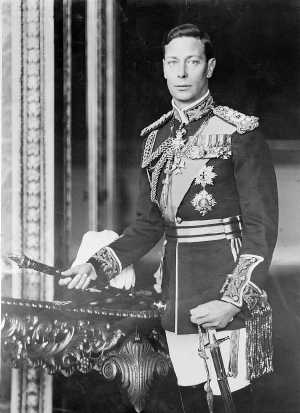 SKC Films Library |
| SKC Films Library >> England >> 20th Century |
| George VI King of Great Britain, 1937-1953
Albert Frederick Arthur George was born at Sandringham, Norfolk, on December 14, 1895, the second son of George V and Mary of Teck. He was educated by private tutors before attending the Osborne and Dartmouth naval schools, and became a midshipman aboard the H.M.S. Collingwood in 1915. He served with the Grand Fleet at the Battle of Jutland during World War I, but his naval service was otherwise uneventful. He joined the Royal Flying Corps in 1918, but did not receive his wings until the war was almost over. Following the war, the prince attended Trinity College, Cambridge University (1919). He was created Duke of York in 1920. In this capacity, he served as president of the Industrial Welfare Society, which aimed to promote industrial relations. He also founded the Duke of York's Camp for Boys, which brought together boys from all walks of life and let them enjoy outdoor life; the was a regular attendee of these camps. In April 1923, he married Lady Elizabeth Bowes-Lyon, daughter of a Scottish aristocratic family. The couple had two daughters, Elizabeth (1926) and Margaret Rose (1930). Succession to the Throne and Major Events of His Reign King George V died on January 20, 1936. He was succeeded by his eldest son, who was subsequently crowned King Edward VIII. Soon after his accession, however, Edward announced his desire to marry an American divorcee, and was faced with the choice of either going ahead with the marriage and compromising the integrity of the royal line, of foregoing the marriage and living a less-than-happy life, or of abdicating the throne in order to pursue the marriage. Edward chose to abdicate, and did so on December 11, 1936, thus elevating his younger brother to the throne. The Duke of York was formally crowned as King George VI on May 12, 1937. On September 3, 1939, England declared war on Germany, plunging the nation into World War II. Initially unpopular with the British public because of the circumstances surrounding his accession, the king earned the respect of his subjects when he refused to leave London during the Blitz, and by living on the same war-time rations as everyone else. His courage and devotion to duty also earned him the respect of Prime Minister Winston Churchill, with whom the king came to have a valued relationship. In 1942, the king founded the George Medal and the George Cross to honor the "many acts of heroism performed both by male and female persons especially during the present war". That same year, the George Cross was given to the island and people of Malta in recognition of the bravery they displayed during the long German siege. Under the Labour governments of the years following the war, England nationalized the Bank of England and the coal and steel industries, and instituted socialized medicine. In 1947, India and Pakistan became independent, and the words Emperor of India were officially dropped from the royal title. A heavy smoker, King George VI underwent lung surgery in 1951. He died in his sleep at Sandringham on February 6, 1952. He was succeeded by his oldest daughter, who was crowned Queen Elizabeth II in 1953. SOURCE SEE ALSO |
| SKC Films Library >> England >> 20th Century This page was last updated on June 16, 2018. |
